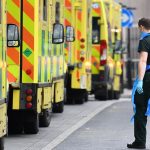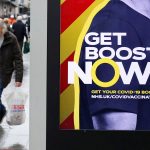More than 3.7 million people in England and Wales have been told that after today they no longer need to shield from the coronavirus.
The extremely clinically vulnerable, including cancer patients having chemotherapy and stem cell transplant recipients, should now follow the same rules as the rest of the population.
A letter sent to the group said shielding has been paused due to falling virus infection rates, but it still urged the most vulnerable to keep social contacts to a minimum and to stay at a distance from other people.
Those on the shielding list should work from home where possible but bus driver Matt Hemming, a kidney transplant recipient on the shielding list, is worried about having to return too soon.
Mr Hemming said he didn’t understand why shielding has to “end overnight”, and thought the transition should be “drawn out with more precautions”.
He said: “I don’t yet have a date for my second vaccine and my consultant has advised me not to return to work until at least three weeks after I’ve had my second jab.”
Research from the charity Scope suggests 75% of disabled people plan to continue shielding until after their second vaccine dose.
Louise Rubin, head of policy and campaigns at Scope, said many people would be “filled with anxiety” about “being forced into a choice between their health and their finances”.
Another charity warned that employers must “make adjustments” for the clinically vulnerable after shielding ends.
Macmillan Cancer Support policy officer Sara Bainbridge said: “It doesn’t need to change immediately.
“Employers need to take into account that this is a difficult situation for someone who might not have been in the workplace for a long time. We know there are options and adjustments that can be made safely.”
Those on the shielded patient list were asked to stay at home as much as possible from the 5 January, and in February 1.7 million people in England were added to the list. More than 90% have had their first dose of the COVID-19 vaccine.
People who were shielding can access priority supermarket delivery slots until 21 June if they have already registered.
GPs have also been asked to maintain the shielding list in case it is necessary to identify clinically extremely vulnerable people in the future and to resume shielding.
Deputy Chief Medical Officer for England Dr Jenny Harries said she recognised the impact shielding has had on people’s wellbeing and it is the “right time for people to start thinking about easing up on these more rigid guidelines”.
Dr Harries said: “We will continue to monitor all of the evidence and adjust this advice should there be any changes in infection rates”.






















